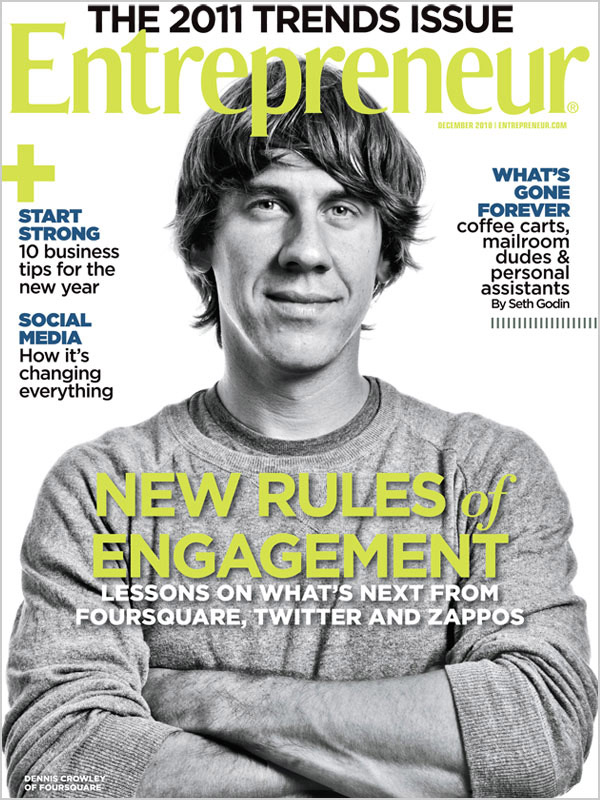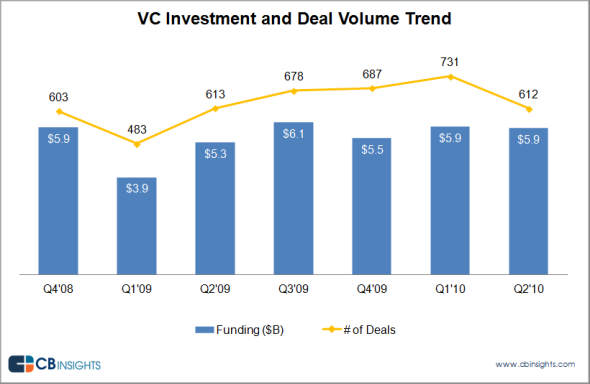If necessity is the mother of invention, then perhaps imagination is the source of innovation.
In December 2010, I was given the opportunity to write the cover story for Entrepreneur Magazine. The article, “Change: Lessons on What’s Next,” explored the innovation behind three (well four) companies — Foursquare, Square + Twitter, and Zappos. Throughout the years, I’ve had the opportunity to spend time with Dennis Crowley, Jack Dorsey and Tony Hsieh. And over that time, I’ve observed inherent traits that I believe represent the future of business and how companies engage with customers to create a more adaptive and connected infrastructure to compete for the future.
What I will share here is the unabridged version of the my article and also the uncut interviews with Crowley, Dorsey and Hsieh through a week-long series. I believe it will inspire you to see things differently and to look beyond the tools and networks that we lean on today in our attempts to introduce change. These stories place greater emphasis on innovation and a quest to deliver a more meaningful experience that in the end, reveal that technology represents enablers while you and your passion represent the capacity to lead change.
The Spirit of Innovation and Entrepreneurialism is Recession Proof
The spirit of entrepreneurialism powers capitalism. And the ideas we envision and the passion to bring them to life define the state of our economy and the future of business universally. While growth markets and recessions force the expansion and contraction of economies, innovation is constant and it is the very essence of the ideas that push thinking and markets forward. Innovation is the proverbial yo-yo on an escalator and while economies may ascend and descend, they are always going up.
In September 2010, the National Bureau of Economic Research, the official arbiter of the U.S. business cycle, announced that the recession behind curbed consumer spending and confidence officially ended in June 2009. What wasn’t constrained during these last few years however, was innovation. Entrepreneurs were the beneficiaries of a constant source of funding to materialize new products, services and technologies. While the number and size of deals bobbed with the financial tide, in Q2 2010, 612 deals were closed to the sum of just under $6 billion.
Even though entrepreneurs can seek comfort in knowing that financial and now consumer support is at the ready, a new challenge is manifesting as you read this. The pervasiveness of Internet-savvy consumers is undergoing a pivotal transformation. As such, the typical digital consumer is now giving way to the rise of a more discerning, informed, and connected social consumer. These consumers are surrounding themselves with the people and information that helps them make better decisions thanks to social networks such as Facebook, Twitter, and YouTube. Their attention is focused in new paradigms and away from traditional media that served as a means for branding and demand creation. Simply said, in order to connect new ideas with social consumers, new or adaptive business models are mandatory. Gone are the days when great companies, products and services naturally found their markets. In the attention economy, businesses must manually connect with customers and prospects where their attention and interest is focused.
The importance of innovation doesn’t just lie in the development of brilliant ideas, innovation is now also necessary in the development and execution of these ideas and how corresponding infrastructures erect and evolve to support and scale with them. The “modern” schools of business management suddenly appear old school in the face of new media. And with the rise of the social consumer, tomorrow’s business leaders are now forced to rewrite the books that help grow companies and markets today. These new leaders will also change the lessons students learn in school and the lessons they will continue to learn through experience.
Innovation is an essential ingredient in not only the survival of emerging companies, but now business in general. And, innovation is not limited to technology or the entrepreneurs that innovate on their own. Tomorrow’s business will empower a new genre of intrapreneuers to create and innovate internally. Ideas can change processes, systems, and methodologies to lead businesses from static entities to dynamic organizations. We are forced to compete for the future, right here, right now and as such, the future of business is not created, it is co-created!
In this series, we take a look at three innovators who are changing the game. Their vision, ambition, and ingenuity prove that sometimes breaking the rules or writing them as they go is what it takes to push business toward a new genre of success.
Introduction: The Innovator’s Dilemma
Part 1: Jack Dorsey, Twitter and Square
Part 2: Zappos’ Tony Hsieh Delivers Happiness Through Service and Innovation
Part 3: Dennis Crowley, FourSquare
Connect with Brian Solis on Twitter, LinkedIn, Facebook
___
The New ENGAGE!: If you’re looking to FIND answers in social media and not short cuts, consider Engage!: Choose from the Deluxe or Paperback edition
___
Get The Conversation Prism:
___
Image Credit: Shutterstock







I completely understand how the ‘new school’ of business management that you are describing can be intimidating to the more established business infrastructures. So much of the old school is based around control, policy, and moderation. The modern corporate landscape is moving so fact that its almost impossible to define policy on the fly and adapt as quickly as is necessary. Control in the traditional sense of the word is extremely challenging.
It’s great to see some of the established brands of the old school jumping into social media, but there are many who are still sitting on the sidelines, trying to figure it all out before jumping in. By the time, they get their acts together, we’ll be on to the next thing. Perhaps holographic marketing?
Thanks for the article, Brian! I’m looking forward to the interviews.
– Greg
Thanks for this great article Brian! During the past year I have attended countless webinars, seminars and read: Engage!, Delivering Happiness, Tipping Point, Blink, Shift, Drive, Fascinate, Sway, Socialnomics, The Facebook Effect, Influence, The Starbucks Experience, C-Scape, The Great Reset, Trust Agents, Crush It!, Empowered, Flip the Funnel, Change by Design and Business Lessons from the Edge.
There are so many new problems to solve and needs to fill, but the two main challenges I see are this:
1. People are stuck on the way things used to work.
My advice: wipe the slate clean, read some of these awesome books from the new thought leaders {cost is free at the library, and the value received is priceless!} and start being the CEO of “You, Inc.” based on your passion.
2. People are connecting to anyone without a purpose in mind.
My advice: Preparedness + Opportunity = Luck…you must be prepared first: have a brand {passion}, get a plan{purpose} and plug in with knowledge, resources and tools {credibility}, before you are ready to seek new opportunities {online and offline connections} to see results {profits}.
Looking forward to seeing new entrepreneurs engage in New Think/Innovation to change our world for the better.
Power up!
Kathy
By the way: I really enjoyed your presentation in Phoenix at Arizona Entrepreneurship Conference in November and can see why Entrepreneur Magazine chose you for the cover article-congrats! A month before that I heard Tony Hsieh speak at the Perfect Business Summit with his message: Passion and customers before profit. Keep up the good work Brian and Tony!
“The Spirit of Innovation and Entrpreneurialism is Recession Proof”
Definitely!
It’s going to be interesting in 20, 30, 100 years how the history of this era will be intepreted. How much of the change we’re undergoing parallels previous eras of rapid change? How much is truly new? I’m not speaking of the technology, rather, the underlying culture which is affected by – and affects – the technology. My hunch is that future historians will find both 1. unprecedented change, and 2. more the things change, the more they stay the same!
Which will be which is the interesting part.
Brian, This is a very thought-provoking post. It seems that nothing is constant — except change! As a social media consultant, I appreciated your description of “the rise of a more discerning, informed, and connected social consumer. These consumers are surrounding themselves with the people and information that helps them make better decisions thanks to social networks such as Facebook, Twitter, and YouTube.”
“The importance of innovation doesn’t just lie in the development of brilliant ideas, innovation is now also necessary in the development and execution of these ideas and how corresponding infrastructures erect and evolve to support and scale with them. ”
Everyone has great ideas. We now have incredible tools to realize them. Time to get to work! Thanks Brian.
Very insightful post Brian…this is not just the age of Innovation…its part of every business now!
P.S. – There are no links in the 3 parts mentioned above?
Anirudh, thank you. You are absolutely correct. FYI…the first link is live. The other two parts of the series are not yet published.